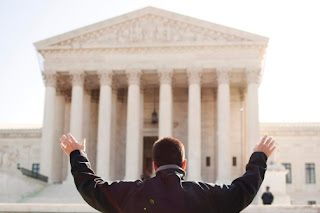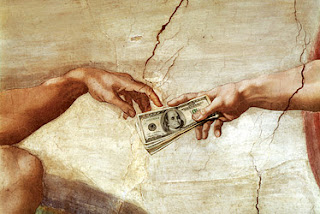
If you go to the second floor of the National Museum of American History in Washington, D.C., you’ll find a small room containing an 18th-century Bible whose pages are full of holes. They are carefully razor-cut empty spaces, so this was not an act of vandalism. It was, rather, a project begun by Thomas Jefferson when he was 77 years old. Painstakingly removing those passages he thought reflected the actual teachings of Jesus of Nazareth, Jefferson literally cut and pasted them into a slimmer, different New Testament, and left behind the remnants (all on display until July 15). What did he edit out? He told us: “We must reduce our volume to the simple evangelists, select, even from them, the very words only of Jesus.” He removed what he felt were the “misconceptions” of Jesus’ followers, “expressing
unintelligibly for others what they had not understood themselves.” And it wasn’t hard for him. He described the difference between the real Jesus and the evangelists’ embellishments as “diamonds” in a “dunghill,” glittering as “the most sublime and benevolent code of morals which has ever been offered to man.” Yes, he was calling vast parts of the Bible religious manure.
When we think of Jefferson as the great architect of the separation of church and state, this, perhaps, was what he meant by “church”: the purest, simplest, apolitical Christianity, purged of the agendas of those who had sought to use Jesus to advance their own power decades and centuries after Jesus’ death. If Jefferson’s greatest political legacy was the Declaration of Independence, this pure, precious moral teaching was his religious legacy. “I am a real Christian,” Jefferson insisted against the fundamentalists and clerics of his time. “That is to say, a disciple of the doctrines of Jesus.”

Politicized Faith

And more intensely relevant to our times. Jefferson’s vision of a simpler, purer, apolitical Christianity couldn’t be further from the 21st-century American reality. We inhabit a polity now saturated with religion. On one side, the Republican base is made up of evangelical Protestants who believe that religion must consume and influence every aspect of public life. On the other side, the last Democratic primary had candidates profess their faith in public forums, and more recently President Obama appeared at the National Prayer Breakfast, invoking Jesus to defend his plan for universal health care. The crisis of Christianity is perhaps best captured in the new meaning of the word “secular.” It once meant belief in separating the spheres of faith and politics; it now means, for many, simply atheism. The ability to be faithful in a religious space and reasonable in a political one has atrophied before our eyes.
Organized Religion in Decline

For their part, the mainline Protestant churches, which long promoted religious moderation, have rapidly declined in the past 50 years. Evangelical Protestantism has stepped into the vacuum, but it has serious defects of its own. As New York Times columnist Ross Douthat explores in his unsparing new book, Bad Religion: How We Became a Nation of Heretics, many suburban evangelicals embrace a gospel of prosperity, which teaches that living a Christian life will make you successful and rich. Others defend a rigid biblical literalism, adamantly wishing away a century and a half of scholarship that has clearly shown that the canonized Gospels were written decades after Jesus’ ministry, and are copies of copies of stories told by those with fallible memory. Still others insist that the earth is merely 6,000 years old—something we now know by the light of reason and science is simply untrue. And what group of Americans have pollsters found to be most supportive of torturing terror suspects? Evangelical Christians. Something has gone very wrong. These are impulses born of panic in the face of modernity, and fear before an amorphous “other.” This version of Christianity could not contrast more strongly with Jesus’ constant refrain: “Be not afraid.” It would make Jefferson shudder.
It would also, one imagines, baffle Jesus of Nazareth. The issues that Christianity obsesses over today simply do not appear in either Jefferson’s or the original New Testament. Jesus never spoke of homosexuality or abortion, and his only remarks on marriage were a condemnation of divorce (now commonplace among American Christians) and forgiveness for adultery. The family? He disowned his parents in public as a teen, and told his followers to abandon theirs if they wanted to follow him. Sex? He was a celibate who, along with his followers, anticipated an imminent End of the World where reproduction was completely irrelevant.
The Crisis of Our Time

That’s why polls show a huge majority of Americans still believing in a Higher Power. But the need for new questioning—of Christian institutions as well as ideas and priorities—is as real as the crisis is deep.
Back to Jesus

The religious order that goes by his name began quite simply with a couple of friends who were captured by the sheer spiritual intensity of how Francis lived. His inspiration was even purer than Jefferson’s. He did not cut out passages of the Gospels to render them more reasonable than they appear to the modern mind. He simply opened the Gospels at random—as was often the custom at the time—and found three passages. They told him to “sell what you have and give to the poor,” to “take nothing for your journey,” not even a second tunic, and to “deny himself” and follow the path of Jesus. That was it. So Francis renounced his inheritance, becoming homeless and earning food by manual labor. When that wouldn’t feed him, he begged, just for food—with the indignity of begging part of his spiritual humbling.
Francis insisted on living utterly without power over others. As stories of his strangeness and holiness spread, more joined him and he faced a real dilemma: how to lead a group of men, and also some women, in an organization. Suddenly, faith met politics. And it tormented, wracked, and almost killed him. He had to be last, not first. He wanted to be always the “lesser brother,” not the founder of an order. And so he would often go on pilgrimages and ask others to run things. Or he would sit at the feet of his brothers at communal meetings and if an issue could not be resolved without his say-so, he would whisper in the leader’s ear.
A Vision of Holiness

His revulsion at even the hint of comfort or wealth could be extreme. As he lay dying and was offered a pillow to rest on, he slept through the night only to wake the next day in a rage, hitting the monk who had given him the pillow and recoiling in disgust at his own weakness in accepting its balm. One of his few commands was that his brothers never ride a horse; they had to walk or ride a donkey. What inspired his fellow Christians to rebuild and reform the church in his day was simply his own example of humility, service, and sanctity.
A modern person would see such a man as crazy, and there were many at the time who thought so too. He sang sermons in the streets, sometimes just miming them. He suffered intense bouts of doubt, self-loathing, and depression. He had visions. You could have diagnosed his postwar conversion as an outgrowth of posttraumatic-stress disorder. Or you can simply observe what those around him testified to: something special, unique, mysterious, holy. To reduce one’s life to essentials, to ask merely for daily bread, forgiveness of others, and denial of self is, in many ways, a form of madness. It is also a form of liberation. It lets go of complexity and focuses on simplicity. Francis did not found an order designed to think or control. He insisted on the simplicity of manual labor, prayer, and the sacraments. That was enough for him.
Learning How to Live

This doesn’t imply, as some claim, the privatization of faith, or its relegation to a subordinate sphere. There are times when great injustices—slavery, imperialism, totalitarianism, segregation—require spiritual mobilization and public witness. But from Gandhi to King, the greatest examples of these movements renounce power as well. They embrace nonviolence as a moral example, and that paradox changes the world more than politics or violence ever can or will. When politics is necessary, as it is, the kind of Christianity I am describing seeks always to translate religious truths into reasoned, secular arguments that can appeal to those of other faiths and none at all. But it also means, at times, renouncing Caesar in favor of the Christ to whom Jefferson, Francis, my grandmother, and countless generations of believers have selflessly devoted themselves.
The saints, after all, became known as saints not because of their success in fighting political battles, or winning a few news cycles, or funding an anti-abortion super PAC. They were saints purely and simply because of the way they lived. And this, of course, was Jefferson’s deeply American insight: “No man can conform his faith to the dictates of another. The life and essence of religion consists in the internal persuasion or belief of the mind.”
Jefferson feared that the alternative to a Christianity founded on “internal persuasion” was a revival of the brutal, bloody wars of religion that America was founded to escape. And what he grasped in his sacrilegious mutilation of a sacred text was the core simplicity of Jesus’ message of renunciation. He believed that stripped of the doctrines of the Incarnation, Resurrection, and the various miracles, the message of Jesus was the deepest miracle. And that it was radically simple. It was explained in stories, parables, and metaphors—not theological doctrines of immense complexity. It was proven by his willingness to submit himself to an unjustified execution. The cross itself was not the point; nor was the intense physical suffering he endured. The point was how he conducted himself through it all—calm, loving, accepting, radically surrendering even the basic control of his own body and telling us that this was what it means to truly transcend our world and be with God. Jesus, like Francis, was a homeless person, as were his closest followers. He possessed nothing—and thereby everything.
Christianity Resurrected

This Christianity comes not from the head or the gut, but from the soul. It is as meek as it is quietly liberating. It does not seize the moment; it lets it be. It doesn’t seek worldly recognition, or success, and it flees from power and wealth. It is the religion of unachievement. And it is not afraid. In the anxious, crammed lives of our modern twittering souls, in the materialist obsessions we cling to for security in recession, in a world where sectarian extremism threatens to unleash mass destruction, this sheer Christianity, seeking truth without the expectation of resolution, simply living each day doing what we can to fulfill God’s will, is more vital than ever. It may, in fact, be the only spiritual transformation that can in the end transcend the nagging emptiness of our late-capitalist lives, or the cult of distracting contemporaneity, or the threat of apocalyptic war where Jesus once walked. You see attempts to find this everywhere—from experimental spirituality to resurgent fundamentalism. Something inside is telling us we need radical spiritual change.
But the essence of this change has been with us, and defining our own civilization, for two millennia. And one day soon, when politics and doctrine and pride recede, it will rise again.
Andrew Sullivan, former editor of The New Republic, weekly columnist for the Sunday Times of London, brought his hugely popular blog, The Dish, to the Daily Beast in 2011. He's the author of several books, including "Virtually Normal," "Love Undetectable," and "The Conservative Soul."
--------
http://www.thedailybeast.com/newsweek/2012/04/01/andrew-sullivan-christianity-in-crisis.html
http://imspeakingtruth.files.wordpress.com/2009/01/prosperity.jpg
http://www.abc.net.au/news/image/1895574-3x2-940x627.jpg
http://graphics8.nytimes.com/images/2006/07/30/us/30pastor.xlarge1.jpg
http://i.usatoday.net/news/_photos/2011/11/08/Letters-Politics-needs-more-Christianity-GCIKAFL-x-large.jpg
http://1.bp.blogspot.com/-BpV_y4_uNc0/T2jPLXfVbZI/AAAAAAAAJuE/CNqxiZg3U_s/s1600/santorum-church%255B1%255D.jpg


MODERN "JEWS" ARE NO MORE DESCENDED FROM MOSES AND KING DAVID THAN MY DOG IS. They're descended from Khazarian barbarians. About 750 A.D. the Khazarian's leader, King Bulan, decided to adopt a "one God" religion for his people, so he invited representatives of Christianity, Islam and Judaism to present their dogma. King Bulan chose Judaism. If he had chosen Christianity, it would have aroused the anger of the large number of followers of Islam in the surrounding area; and if he had chosen Islam, it would have aroused the anger of the large number of Christians around them. So, he played it safe - he chose Judaism. BY THE WAY, THIS BOOK WAS WRITTEN BY A "JEW".
ReplyDeletehttp://iamthewitness.com/books/Jack.Bernstein/My.Farewell.to.Israel.htm
DEAN BERRY MINISTRIES: "I speak the truth. You don't like it? It's still the truth."